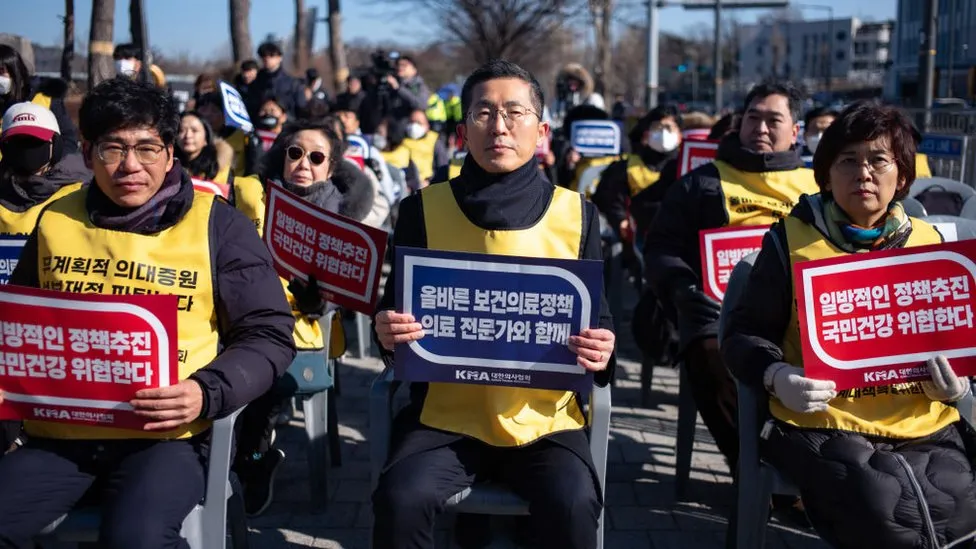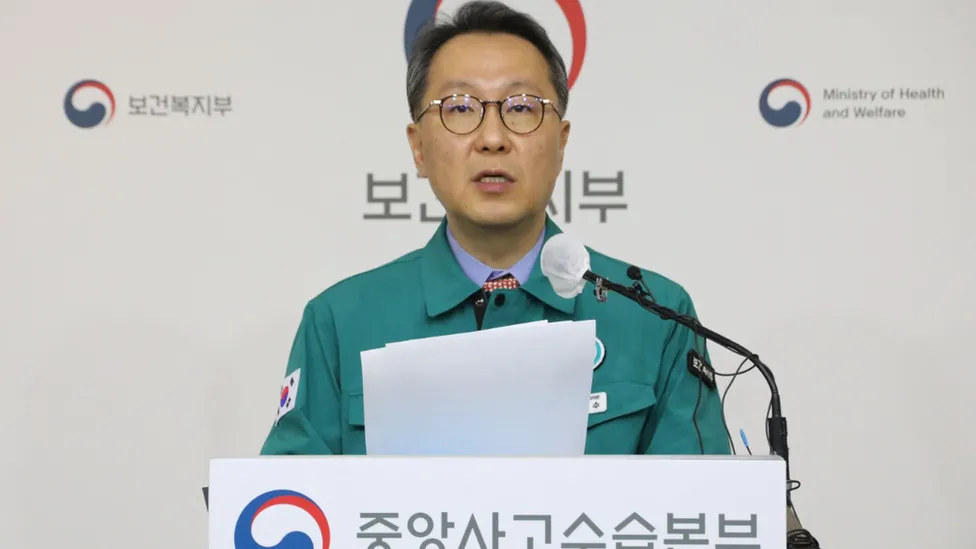Surgeries were delayed and hospitals turned away patients after more than 1,600 doctors went on strike in South Korea on Tuesday.
Junior doctors are protesting the government's plan to introduce more trained doctors into the system.
South Korea has one of the lowest doctor-to-patient ratios among major economies, so the government wants to add more medical school enrollments.
But doctors oppose the prospect of greater competition, observers say.
South Korea has a highly privatized healthcare system where most procedures are linked to insurance payment and over 90% of hospitals are private.
Data for 2022 from the Organization for Economic Co-operation and Development (OECD) shows that specialists in a public hospital earn around $200,000 (£159,000) a year; A salary much higher than the national average salary.
But there are currently only 2.5 doctors per 1,000 people - the second lowest rate among OECD countries after Mexico.
"More doctors mean more competition and reduced income for them...that's why they are against proposals to increase the supply of doctors," said Professor Kwon Soon-man, a public health expert at Seoul National University.
There is a shortage of doctors in remote areas of the country and in specialties such as pediatrics and obstetrics – which are seen as less lucrative fields of practice than dermatology and plastic surgery.
What happened this week?
About 6,500 interns and residents - about half of the junior doctor workforce - submitted their resignations on Monday, the country's health ministry said.
Of that group, about 1,600 doctors failed to act. Organizers of the protest - the Korean Medical Association and the Korea Interns and Residents Association - called on members to stop work altogether on Tuesday.
The government ordered medics to return to work with President Yoon Suk-yeol condemning a campaign she said was "holding people's lives and health hostage".
He said he was aware of cases where cancer surgeries had already been postponed due to walk-outs. South Korean media also reported cases of patients being discharged or transferred to other hospitals.
Junior doctors form a key group of staff in emergency wards, and Yonhap reported that up to 37% of doctors at Seoul's largest hospital could be affected.
"We are deeply disappointed in the situation where trainee doctors are refusing to work," Second Vice Health Minister Park Min-soo told reporters earlier this week.
On Tuesday he said the government would take legal action to break the strike - the authority has the statutory power to revoke doctors' practice licenses if their actions threaten national healthcare.
The country has previously sued striking doctors. The government said it was taking action against two officials of the Korean Medical Association on Tuesday.
"We earnestly ask the physicians to reverse their mass resignation decision," Mr. Park said.
The full extent of the strike's impact is not yet clear. However, several hospitals said they had switched to contingency plans and officials warned of gaps.
The government also pledged to expand telehealth services during the strike earlier this week.
South Korean policymakers have been trying to increase the number of doctors for decades, as the country deals with a rapidly aging population that will overburden the medical system.
President Yoon Suk-yeol proposed adding 2,000 spots per year to medical schools—a 65% increase over the current annual intake of just over 3,000 students. That rate has not changed since 2006.
President Yun said there could be a shortage of 15,000 doctors by 2035 if the government does not act now.
His policies proved very popular with the public - polls showed support of up to 80%.
But doctors' groups such as the Korean Medical Association argue that the increase will put a strain on funds available under the national health insurance scheme.
The union also argued that more doctors would not necessarily fill shortages in certain areas despite the government setting targets for these areas.
The doctors' unions announced the strike after an emergency meeting with hospital representatives on Sunday. Junior doctors are the first to strike, but there are fears that others across the profession will join.
Doctors had successfully blocked the government's earlier attempt to introduce more graduates in 2020 with protests that threatened to paralyze hospitals during the Covid pandemic.
Up to 80% of junior doctors participated in the strike at that time.
"It's not easy to predict who will win [this time]," said Professor Kwon
He noted that President Yun "seems very determined" because the policy has provided a ratings-bump for a leader tarnished by political scandals.
"But a private-sector-dominated health system is quite vulnerable to a physician strike, meaning it could really shut down if doctors joined a full-scale strike."
Source: BBC News






